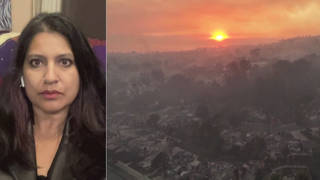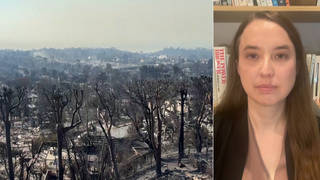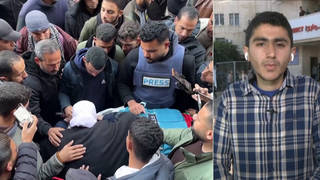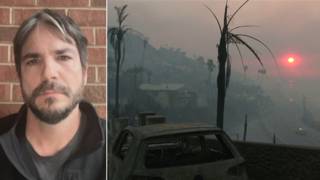
Related
The watch list of over 100,000 names will be widely accessible to law enforcement agents, border police, airport workers as well as some private industries. It will contain the names of both international and domestic “suspects.” [Includes transcript]
Click here to read to full transcript The Bush Administration announced Tuesday the creation of a massive computerized watch list that will contain over 100,000 names of individuals the government claims are “known and suspected terrorists.”
The watch list will be widely accessible to law enforcement agents, border police, airport workers as well as some private industries. It will contain the name of both international and domestic suspects.
Attorney General John Ashcroft has praised the new Terrorist Screening Center because it will “provide one-stop shopping so that every federal anti-terrorist screener is working off the same page — whether it’s an airport screener, an embassy official issuing visas overseas or an FBI agent on the street.”
It is unclear what criteria the government will use to place individuals on the watch list or if citizens will be able to appeal their inclusion in the FBI-controlled database.
Anthony Romero, executive director of the American Civil Liberties Union, said “Our greatest concern is that innocent people might be wrongly labeled as terrorists, with little or no recourse to clear their names. The government must tell us how it plans to keep this watch list from turning into a blacklist that will inevitably ruin innocent lives.”
- Michael Ratner, president, Center for Constitutional Rights.
TRANSCRIPT
AMY GOODMAN: Our last segment today, the Bush administration announcing creation of a massive computerized watch list that will contain over 100,000 names of individuals the government claims are “known and suspected terrorists”. The watch list will be widely acceptable to law enforcement agents, border police, airport worker as well as some private industries. It will done contain the name of both international and domestic so-called suspects.
JUAN GONZALEZ: Attorney General John Ashcroft praised the new terrorist screening center because it will, quote, provide “one-stop shopping so that every federal antiterrorist screener is working off the same page, whether it’s an airport screener, embassy official using Visas overseas or an F.B.I. agent on the street.”
It is unclear what criteria the government will use to place individuals on the watch list or if citizens will be able to appeal their inclusion in the F.B.I.-controlled database. Anthony Romero, the Executive Director of the American Civil Liberties Union said “our greatest concern is that innocent people might be wrongly labeled as terrorists with little or no recourse to clear their names. The government must tell us how it plans to keep this watchlist from turning into a blacklist that will inevitably ruin innocent lives”.
AMY GOODMAN: We’re on the phone right now with Michael Ratner, president for the Center for Constitutional Rights. Michael, a one-stop shopping, 100,000 name terror list?
MICHAEL RATNER: I don’t think it’s really a question of just having some innocent names on the list that being the problem. The problem is the list altogether.
Everybody on that list is innocent. The question is why is there a list at all, other than to basically say people are guilty until proven innocent. That list is going to go all over the place and basically bias prejudice people lives, whether it comes to getting a job, particularly a government job or anything else. As Juan pointed out, there’s no criteria that we know of how you get on that list. Why there has to be a list at all, I don’t know.
If wanting to have suspects that you investigate, a handful, a few, a hundred, few hundred, to have a list of 100,000 people that you can’t get on and off, that you don’t know the criteria that going to circulate is really a political, legal and moral outrage.
It reminds me, and Juan may remember this, maybe you as well, Amy, when Hoover had lists like this. The Rabblerouser Index in the 1950s and 1960s, there was a Security Index. Those were all ways of classifying basically people based on their free speech, on their political activities. That’s what this list is really about.
This is going to put all of us into a list of various people who oppose U.S. policies in the Mideast, oppose whatever else. I think this is really going to be a dissenters list.
AMY GOODMAN: We already saw these lists being developed, the CAPS Program at airports. How does this list, is this a separate list from that, and is this now being given out to just local businesses?
MICHAEL RATNER: Well, I think this is going to be what we call the superlist, this is going to take all those lists, CAPS hasn’t really been completed at the airports, but there is a of course a no-fly list of some sort. Those lists will offbeat into this master list. At this point they haven’t revealed yet whether employers are going to be able to get this list. Certainly government employers will.
AMY GOODMAN: It does say it will be given to private industry.
MICHAEL RATNER: Then that’s really even more awful than I would ever us suspect, because what I was going to say is, that these lists do go, eventually get a life of their own and get circulated. There’s a list now of 370 people on some kind of list like this, and that’s been all over the place. You can get it on the Internet now, of people, a lot of people who should never have been on that list, there are a lot of people who are double names or similar names. so once this list gets out to the world, that’s it. Can you imagine 100,000 people on a list? Some of them are…
AMY GOODMAN: We only have 10 seconds. How do you deal with this? How will CCR deal with this?
MICHAEL RATNER: Well, you’ve got to fight completely. You can’t allow a list like this at all. It’s not a question of innocent or guilty, it’s a question of why in the heck should we have list of people based on suspicion. unarticulated suspicion. I presume as soon as we find someone on this list, if not before..
AMY GOODMAN: I want to thank you very much for being with us, Michael Ratner, president of the Center for Constitutional Rights. I’m Amy Goodman with Juan Gonzalez, thanks for joining us.










Media Options